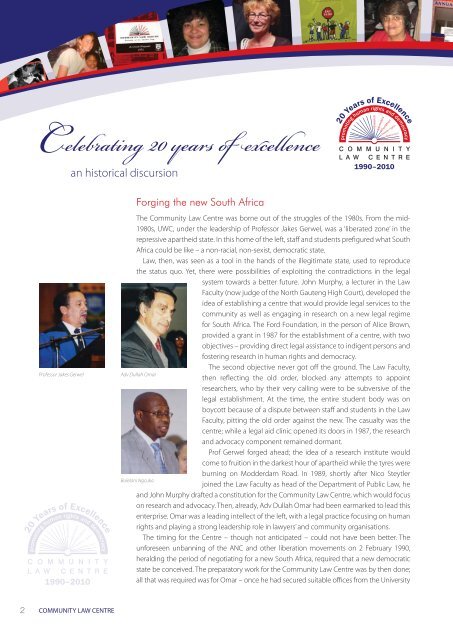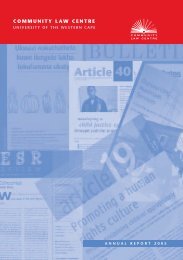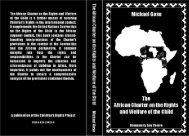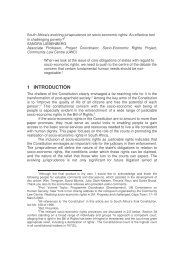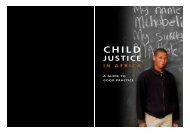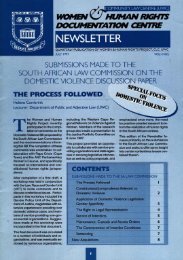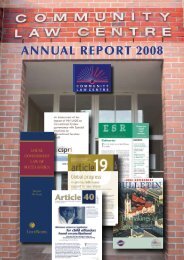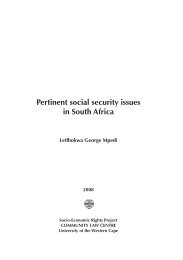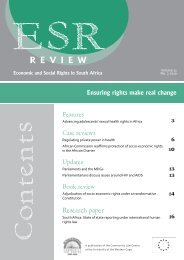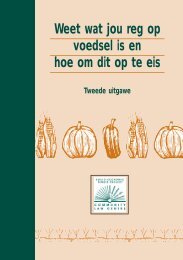printed version - Community Law Centre
printed version - Community Law Centre
printed version - Community Law Centre
- No tags were found...
You also want an ePaper? Increase the reach of your titles
YUMPU automatically turns print PDFs into web optimized ePapers that Google loves.
Celebrating 20 years of excellencean historical discursionProfessor Jakes GerwelForging the new South AfricaThe <strong>Community</strong> <strong>Law</strong> <strong>Centre</strong> was borne out of the struggles of the 1980s. From the mid-1980s, UWC, under the leadership of Professor Jakes Gerwel, was a ‘liberated zone’ in therepressive apartheid state. In this home of the left, staff and students prefigured what SouthAfrica could be like – a non-racial, non-sexist, democratic state.<strong>Law</strong>, then, was seen as a tool in the hands of the illegitimate state, used to reproducethe status quo. Yet, there were possibilities of exploiting the contradictions in the legalsystem towards a better future. John Murphy, a lecturer in the <strong>Law</strong>Faculty (now judge of the North Gauteng High Court), developed theidea of establishing a centre that would provide legal services to thecommunity as well as engaging in research on a new legal regimefor South Africa. The Ford Foundation, in the person of Alice Brown,provided a grant in 1987 for the establishment of a centre, with twoobjectives – providing direct legal assistance to indigent persons andfostering research in human rights and democracy.The second objective never got off the ground. The <strong>Law</strong> Faculty,then reflecting the old order, blocked any attempts to appointresearchers, who by their very calling were to be subversive of thelegal establishment. At the time, the entire student body was onboycott because of a dispute between staff and students in the <strong>Law</strong>Faculty, pitting the old order against the new. The casualty was thecentre; while a legal aid clinic opened its doors in 1987, the researchand advocacy component remained dormant.Prof Gerwel forged ahead; the idea of a research institute wouldcome to fruition in the darkest hour of apartheid while the tyres wereburning on Modderdam Road. In 1989, shortly after Nico Steytlerjoined the <strong>Law</strong> Faculty as head of the Department of Public <strong>Law</strong>, heand John Murphy drafted a constitution for the <strong>Community</strong> <strong>Law</strong> <strong>Centre</strong>, which would focuson research and advocacy. Then, already, Adv Dullah Omar had been earmarked to lead thisenterprise. Omar was a leading intellect of the left, with a legal practice focusing on humanrights and playing a strong leadership role in lawyers’ and community organisations.The timing for the <strong>Centre</strong> – though not anticipated – could not have been better. Theunforeseen unbanning of the ANC and other liberation movements on 2 February 1990,heralding the period of negotiating for a new South Africa, required that a new democraticstate be conceived. The preparatory work for the <strong>Community</strong> <strong>Law</strong> <strong>Centre</strong> was by then done;all that was required was for Omar – once he had secured suitable offices from the UniversityAdv Dullah OmarBulelani Ngcuka2COMMUNITY LAW CENTRE


